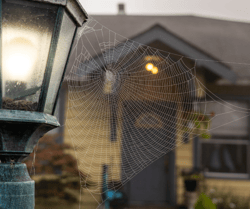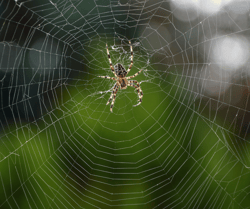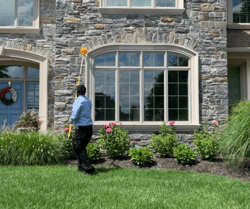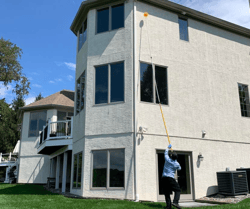While “spooky season” may bring a host of ghoulish and ghastly decorations, real spiderwebs and cobwebs are a true fright for many homeowners. They seem to appear practically overnight, only to be discovered when we unintentionally stumble through one. If the thought of those fine, silken threads clinging to your face like an invisible mummy makes your hair stand on end, you’re not alone. For most homeowners, spiders and their web-woven homes are an unwelcome sight in human living spaces. But does knocking down webs truly discourage spiders from occupying our spaces, or is it merely a waste of time and effort?
Why do Spiders Build Webs?
To better understand whether removing spiderwebs is an effective pest control option, it’s helpful to recognize why spiders build their webs in the first place. Spiders are masters of intricate, silk architecture, and they weave webs for several important reasons. Firstly, spiderwebs primarily serve as hunting tools. These finely woven structures are designed to capture prey, such as insects, by acting as sticky traps. Spiders strategically position themselves in their webs, waiting for vibrations or movements that signal the arrival of potential meals. The web's stickiness ensures that once an unsuspecting insect lands on it, it becomes immobilized, allowing the spider to quickly subdue and consume its prey.
Moreover, spiderwebs also play a crucial role in reproduction. Some male spiders use their silk to create a special type of web known as a "sperm web," where they deposit their sperm. They then transfer this sperm to specialized structures on their pedipalps, which they use to inseminate a female during mating. In some species, courtship rituals involve intricate dances on or around the web to ensure successful reproduction. Spider silk's versatility also extends to protecting their eggs, with many species constructing silk egg sacs to safeguard their offspring until they hatch.
The frequency at which spiders weave webs can vary widely among species and individual circumstances. Some spiders, like orb-weavers, construct new webs every day to maintain their effectiveness in capturing prey. Others, like cobweb or funnel-web spiders, may periodically repair and modify their existing webs rather than spinning entirely new ones. Environmental factors, such as the availability of prey and the presence of predators, can influence the frequency of web construction. Additionally, spiders tend to build larger, more elaborate webs when resources are abundant and decrease web-building activity during times of scarcity.
Spiders also invest energy and resources in web construction based on their life stage. For instance, young spiders may create smaller, less complex webs until they reach maturity and require more substantial structures to catch larger prey. Some species, like the orb-weaving garden spider, exhibit seasonal variations in web construction, building larger webs during the late summer and autumn months when insect populations are typically higher.
In conclusion, spiders build webs primarily for hunting and reproduction. These intricate silk structures serve as effective traps for prey and play a crucial role in ensuring the survival of the spider species. The frequency of web construction varies among species and individuals, influenced by factors such as prey availability, environmental conditions, and life stage. Regardless of the frequency, the artistry and functionality of spiderwebs is remarkable and often overlooked.
 Spiders weave webs for several important reasons.
Spiders weave webs for several important reasons.
Why are There Spiderwebs on my Home?
Spiders building webs on houses is a common phenomenon that can be attributed to several factors. Foremost, spiders are opportunistic creatures that seek out stable and sheltered locations to build their webs. Houses provide an ideal environment for spiders due to their protective structures, including eaves, windowsills, and corners, where spiders can anchor their webs securely. These locations shield the webs from wind and rain, ensuring they remain intact for longer periods.
Another crucial reason for spiders building webs on houses is the abundance of potential prey. Insects are drawn to the lights that often illuminate homes at night, and these insects become easy targets for spiders. As a result, spiders set up their webs near light sources, taking advantage of the steady influx of food. It's essentially a strategic decision, as building webs on houses provides spiders with a consistent source of nourishment.
Spiders are not necessarily selective about the type of structure they choose for web-building. As long as they find a suitable anchor point and a place where they can efficiently capture prey, they are likely to construct their webs. The architecture of many homes inadvertently mimics the natural environments where spiders would typically spin their webs, such as tree branches or bushes. This similarity encourages spiders to establish their webs on houses, much to the homeowner's chagrin.
Simply put, spiders build webs on houses primarily because these structures offer stable anchor points, protection from the elements, and access to a constant supply of prey. As opportunistic predators, spiders take advantage of the architectural features of houses that inadvertently mimic their natural habitats, making them a common presence in and around homes. While some may find these webs unsightly, it's worth remembering that many house-dwelling spiders play a valuable role in controlling insect pests.
.png?width=250&height=210&name=Spider%20on%20Web%20(1).png) Spiders are not necessarily selective about the type of structure they choose for web-building.
Spiders are not necessarily selective about the type of structure they choose for web-building.
What are the Benefits of Leaving Spiderwebs on my Home?
Interestingly, some consider spiders and their webs to be indicative of a symbiotic relationship. This is because leaving spiderwebs on your home can have some surprising benefits that may make you reconsider removing them too hastily. When you allow spiders to use the protective structure of your home to build their webs, they offer:
- Natural Pest Control: Spiders are nature's pest controllers. They feed on a variety of insects, including flies, mosquitoes, ants, and other common household pests. Allowing spiders to establish webs around your home can help keep these pesky insects in check, reducing the need for chemical pesticides and contributing to a healthier, more eco-friendly environment.
- Low Maintenance: Spiderwebs require minimal maintenance. Once a web is established, spiders typically maintain and repair it themselves. This means you don't have to invest time and effort into regularly cleaning or maintaining these webs, unlike other outdoor structures like bird feeders or birdbaths.
- Fascinating Observation: Watching spiders in their natural habitat can be a fascinating and educational experience, especially for children. Leaving spiderwebs in place provides an opportunity to observe these incredible arachnids up close and learn about their behavior and hunting strategies.
- Biodiversity Support: Spiders are a crucial part of local ecosystems, and supporting their presence can contribute to biodiversity. They are an essential food source for many other creatures, including birds and some insects. By allowing spiders to thrive around your home, you indirectly support a healthier and more balanced ecosystem.
While there are benefits to leaving spiderwebs on your home, it's essential to strike a balance. If spider populations become too numerous or if the webs are obstructing entrances, walkways, or windows, it may be necessary to relocate the spiders or remove webs entirely. However, for some, allowing these arachnids to play their role in the ecosystem can be a positive and environmentally friendly choice.
 Spiders are nature's pest controllers.
Spiders are nature's pest controllers.
What are the Consequences of Leaving Spiderwebs on my Home?
While there are some benefits to leaving spiderwebs on your home, there are also potential consequences and considerations to keep in mind:
- Aesthetic Concerns: Many people find spiderwebs unattractive when they accumulate around the exterior of their homes. These webs can collect dust and debris, making them appear unsightly. If you prioritize a neat and well-maintained appearance for your property, the presence of spiderwebs may be a concern.
- Obstruction: Spiderwebs can sometimes obstruct pathways, windows, or entrances, making it inconvenient to move around your home. In such cases, you may need to remove the webs to ensure ease of access and visibility.
- Insects Attracted: While spiders are natural insect predators, their presence can also attract insects that are drawn to the light of your home. In areas with high spider populations, you may notice more flying insects around lights and windows, which can be bothersome.
- Safety Concerns: For those who are sensitive to spider bites or have allergies to spider venom, the presence of spiderwebs near entrances or outdoor seating areas could pose a safety risk. Certain spider species, although typically non-aggressive, may bite if they feel threatened.
- Fear or Phobia: Arachnophobia, or the fear of spiders, is a common phobia. For individuals with this fear, the sight of spiderwebs on or near their home can cause significant anxiety and distress. In such cases, it may be necessary to remove spiderwebs for peace of mind.
- Populations: Leaving spiderwebs undisturbed can lead to an increase in spider populations. While this may not be a problem in and of itself, if spider numbers become excessive, it could potentially create a nuisance, particularly if certain spider species are more aggressive or invasive in your region.
- Seasonal Considerations: Some spider species are more active in certain seasons, leading to an increase in web-building activity during specific times of the year. If you live in an area with seasonal changes, you may notice an overwhelming number of spiderwebs during certain months that may require action.
The consequences of leaving spiderwebs on your home largely depend on your personal preferences, tolerance for spiders, and the specific circumstances of your property. While there are benefits to coexisting with spiders and their webs, there are also potential downsides, particularly if aesthetics, safety, or personal phobias are a concern. Balancing these factors may involve periodically removing webs or selectively relocating spiders to maintain a comfortable and safe living environment.
 Spiderwebs can sometimes obstruct pathways, windows, or entrances.
Spiderwebs can sometimes obstruct pathways, windows, or entrances.
Does Knocking Down Spiderwebs Actually Keep Spiders Away?
Knocking down spiderwebs may temporarily remove visible evidence of spiders' presence, but it does not necessarily keep spiders away in the long term. Spiders are persistent and adaptive creatures, and they will often rebuild their webs if they find the conditions suitable for hunting and survival.
Here are a few reasons why knocking down spiderwebs may not effectively keep spiders away:
- Natural Behavior: Spiders are hardwired to spin webs as part of their natural behavior. It's their primary means of catching prey, and they will continue to do so as long as there are ample food sources and suitable anchor points.
- Territorial Instincts: When you remove a spider's web, you may not necessarily remove the spider itself. Many spiders are territorial and will stay in the same general area. They may rebuild their webs in the same location or nearby.
- Seasonal Activity: Spiders may be more active during certain seasons, leading to an increase in web-building behavior. Knocking down webs during one season may not deter spiders from returning during another.
- Abundant Food Sources: If your home attracts insects and other small prey, spiders will be drawn to these potential food sources. Removing spiderwebs doesn't eliminate the presence of prey, which will continue to attract spiders.
- Reproduction: Some spiders create webs specifically for mating or laying eggs. Knocking down these webs won't prevent spiders from reproducing or laying eggs in or around your home indefinitely.
 Removing spiderwebs doesn't eliminate the presence of prey, which will continue to attract spiders.
Removing spiderwebs doesn't eliminate the presence of prey, which will continue to attract spiders.
Can EcoShield Pest Solutions Help Control Spider Populations and Webs?
Yes! While spiderwebs aren’t typically a problem in and of themselves, webs can become unsightly, overwhelming, and bothersome, particularly if there are many of them and in high activity areas of the home. That’s why we include dewebbing in all Shield Home Protection Plan services. We feel that the peace of mind of a web-free home far outweighs the potential benefits of leaving spiderwebs in place and instead tackle pest control from a preventative perspective by controlling insect populations, including spiders. Give us a call or fill out the form on this page to get started on your pest prevention journey!
